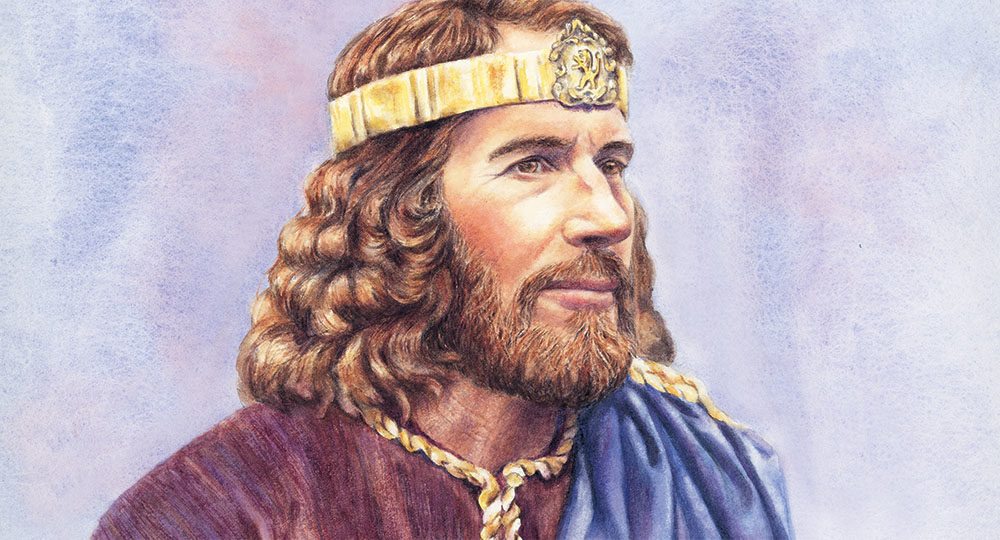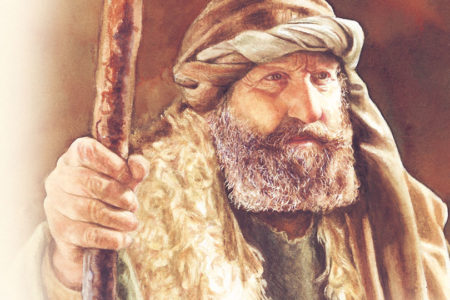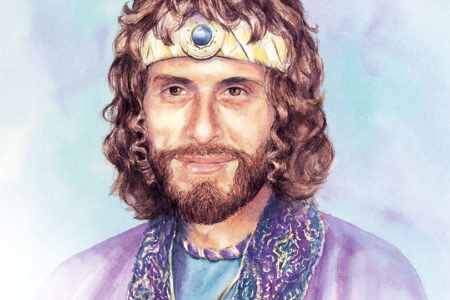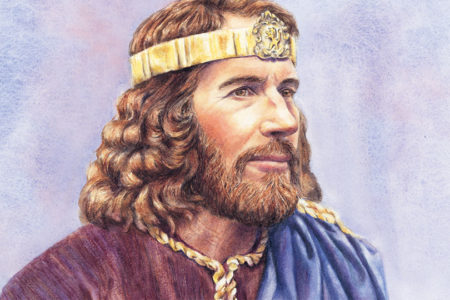Glory and Infamy
Much attention today is directed toward youth. Society is realizing that the future of our communities lies within the youth of today. Yet the vigor and vision of youth sometimes fade as the years go by, producing adults who are disillusioned or desiring some kind of personal reward after years of hard work. People who work their way into significant positions of responsibility certainly deserve their rewards; but when such individuals seek to satisfy their selfish desires, the consequences can be disastrous.
This warning becomes the lesson of King Solomon. Solomon was the model young ruler who sought God’s will and devoted himself to executing it through divine wisdom. Consequently, God blessed Solomon and all of Israel beyond anything that Israel had ever known. But at the end of his life, he strayed from God; and the consequences were so grave that the nation never again attained to the glory of Solomon’s kingdom.
Solomon’s Ascension
As recorded in 1 Kings 1—2, Solomon’s ascension to the throne was not without obstacles. First, he was not David’s firstborn son. As a consequence of David’s sin with Bath-sheba, God declared that “the sword shall never depart” from David’s house (2 Sam. 12:10). That judgment claimed the lives of Amnon and Absalom, the two eldest in line for the throne. This left Adonijah in line. And when David was old, Adonijah proclaimed himself king.
But Nathan the prophet knew God had chosen Solomon; for when Solomon was born to Bath-sheba, who had become David’s wife, the Lord called him Jedidiah, meaning “beloved of the LORD” (2 Sam. 12:24–25). So Nathan persuaded Bath-sheba to tell David what Adonijah had done and ask him to declare young Solomon king. David did. As Adonijah’s followers fell away, his only recourse was to beg for mercy. Thus Solomon became Israel’s third king, the second monarch from the house of David.
Solomon’s Accomplishments
Wisdom (1 Ki. 3). Solomon is best known as the wisest man who ever lived or the epitome of the philosopher-king. Yet Solomon’s wisdom came from his understanding that he needed wisdom. He realized the magnitude of the task of judging God’s people and acknowledged that he needed divine help to do the job with justice. So Solomon asked God for an “understanding heart” (1 Ki. 3:9). Gratified, the Lord granted Solomon his request and made him rich as well.
Wisdom characterized all aspects of Solomon’s rule. As he wrote in Proverbs, “The fear of the LORD is the beginning of knowledge, but fools despise wisdom and instruction” (1:7). Wisdom (Hebrew chokmah) in the Old Testament is never just intellectual brilliance. It incorporates an acknowledgment of God’s sovereignty and Law and recognizes that to succeed in life (i.e., receive the Lord’s blessing), one must love Him and follow His statutes (hence the book of Proverbs). As long as Solomon sincerely followed the Lord, he and all Israel were blessed.
Justice (1 Ki. 3). The initial evidence of this wisdom appeared in the administering of justice. In Israel, the king’s primary duty was to act as “attorney general”—to enforce the Law of Moses. Although the Law was clear, discerning people’s motives was more difficult. The Lord gave Solomon a discerning heart to administer true justice, giving us a glimpse of the ultimate, anointed (Mashiach) King of Israel, who will judge righteously.
Administration (1 Ki. 4—5; 7; 10). Just as David was the warrior and empire builder, Solomon was the consolidator and administrative genius. Like any good administrator, Solomon delegated responsibility to capable officials. To support his officials, he divided Israel into twelve administrative districts, apart from tribal considerations. He established treaties with the surrounding territories that David had subjugated, thus providing economic resources.
Solomon’s trading ships sailed the Red Sea down to Saudi Arabia and possibly the western coast of Africa in search of gold and goods. All these ventures brought great wealth to Solomon and Israel. With the income, he built government buildings and palaces between the City of David and the Temple. He also fortified the militarily important cities of Gezer, Megiddo, and Hazor by building “triple gates.” So “Judah and Israel dwelt safely, every man under his vine and under his fig tree, from Dan even to Beer-sheba, all the days of Solomon” (1 Ki. 4:25).
Consequently, under Solomon, Israel achieved the status of being “a kingdom of priests” (Ex. 19:6) and a “holy nation” amid the world around her.
The story of the queen of Sheba confirms this fact. After being dazzled by Solomon and his kingdom, the queen magnified the God of Israel (1 Ki. 10:9). For a brief moment in history, Israel was a light to the nations, as God had intended her to be. The situation was the result of a godly king who desired to rule with an understanding heart and to adhere to the Law of the Lord.
Temple (1 Ki. 6; 8). Undoubtedly, building the Temple was Solomon’s greatest achievement. Although nothing remains today of this Temple except a small, ivory pomegranate, it must have been magnificent. A relatively small structure (90’ x 30’ x 45’), it nevertheless took seven years to build. Inside and out, it was overlaid with gold, as was the altar. Though Solomon surrounded himself with great buildings and treasures, he also understood the significance of the Temple as the palace of the Lord; and he attempted to make it a house worthy of the glory of God.
In his prayer of dedication, recorded in 1 Kings 8:22–61, Solomon acknowledged his understanding of the Lord as the God not only of Israel but of the whole earth. He knew the Lord dwells in heaven, yet he also understood that a manifestation of God’s glory would grace the Temple. Solomon prayed that the prayers of Israel, directed to the Lord at the Temple, would be heard in heaven.
Although God’s presence was not limited to the Temple (cf. Is. 66:1–2), the Temple was, nevertheless, the focal point of the Lord’s rule on Earth (cf. Ps. 132:13–18). Thus Solomon honored God with this Temple and gave an opportunity for all the people of the world to come and worship the Lord.
Solomon’s Failures
Noncompliance. Deuteronomy 17:14–20 describe how a monarchy fit into the Lord’s theocracy. In essence, the king was to obey and enforce the Law of Moses. He was not above the Law but was to abide by it. The Lord Himself still was King.
Deuteronomy 17:16–17 also specifically state that the king was not to amass horses or wives. The first statute was to prevent the Israelites from returning to Egypt. The second was to prevent the king’s heart from forsaking the Lord. Although Solomon faithfully administered the Law, he did not personally abide by these two laws. And ignoring the second led to his undoing.
In the ancient Near East, a multiplicity of wives signified a man of power and wealth. David himself had many wives, and the fact was seen as evidence of the Lord’s blessing. In addition, kings often established and sealed treaties by trading daughters with foreign rulers, as security against disloyalty. Many of Solomon’s wives were obtained through political arrangements.
For example, Solomon married Pharaoh’s daughter as part of an alliance and even built her a palace in Jerusalem (1 Ki. 3:1). The author of 1 Kings did not disparage Solomon for this action since it was considered the act of a great king. He criticized Solomon not for marrying many wives but because many of them were foreigners, and Solomon loved them (1 Ki. 11:2). He became so enamored with them, in fact, that he began to worship their gods.
Idolatry (1 Ki. 11). It seems almost impossible to imagine that the young Solomon who wrote Proverbs would become the king who practiced idolatry. How did this happen? Was it too much knowledge? Too much wealth? Too many beautiful women?
In Solomon’s book of Ecclesiastes, we read of a wealthy king who tried knowledge, wealth, and pleasure in an attempt to find happiness and meaning. But he concluded that all were vanity. Solomon’s problem was not with the external excesses swirling about him but with the internal allegiances of his heart. Twice the author of 1 Kings repeated the lamentable phrase, “his wives turned away his heart” (1 Ki. 11:3).
How was it, then, that these wives were able to steal Solomon’s heart? The author of 1 Kings revealed the reason. Solomon failed to follow the Law, which specifically warned the Israelites not to associate with the surrounding nations because of the threat of idolatry (Ex. 23:31–33; 34:12–16; Dt. 7:3). Perhaps all Solomon’s blessings caused him to believe he was immune to falling. Perhaps he did not care. Or worse, perhaps he reasoned, “The women who worship these gods are not so depraved after all. In fact, they seem more knowledgeable and interesting than the women of Israel. Maybe God has revealed Himself to Israel as YHWH but also to Sidon as Ashtorah and to Moab as Chemosh. After all, isn’t God bigger than the God of just Israel?” However Solomon justified himself, the consequences of his actions were devastating.
Solomon’s Legacy
King Solomon leaves a mixed legacy. On the one hand, even Jesus alluded to his glory (Mt. 6:29). Solomon’s kingdom marked the apex of Israel’s culture and power in the ancient Near East. In addition, Solomon left us three Old Testament examples of wisdom literature: Proverbs, Ecclesiastes, and Song of Solomon, in which he proclaimed what it means to be truly wise. Solomon’s Temple stood for 373 years and was the center of worship during Israel’s kingdom years until the Babylonians destroyed it in 586 B.C.
On the other hand, the sad and enduring commentary is that Solomon departed from the Lord late in life and, in so doing, laid the seeds for the Temple’s destruction. Despite Solomon’s idolatry, the Lord proved Himself faithful to the Davidic Covenant (2 Sam. 7) and did not remove the kingdom from David’s seed but disciplined his sons. Solomon’s son Rehoboam ruled only over Judah because the other tribes quickly were torn from him (1 Ki. 11:9–13). Thus, under Rehoboam, the kingdom became divided; and the northern kingdom of Israel degenerated rapidly into idolatry under Jeroboam.
Eventually Israel was taken captive by Assyria, and Judah went into captivity in Babylon—all because Solomon did not guard his heart.
Solomon is an example of an individual who occupied a position of responsibility, recognized his deficiencies, and devoted himself to doing what was right. Consequently, he brought blessing to many. Yet he also exemplifies someone who did well when he was young but wandered from the Lord when he grew old. Ultimately, the verdict on Solomon is that he did not take his own advice. At the end of Ecclesiastes, Solomon wrote,
Let us hear the conclusion of the whole matter: Fear God, and keep his commandments; for this is the whole duty of man. For God shall bring every work into judgment, with every secret thing, whether it be good, or whether it be evil (12:13–14).







